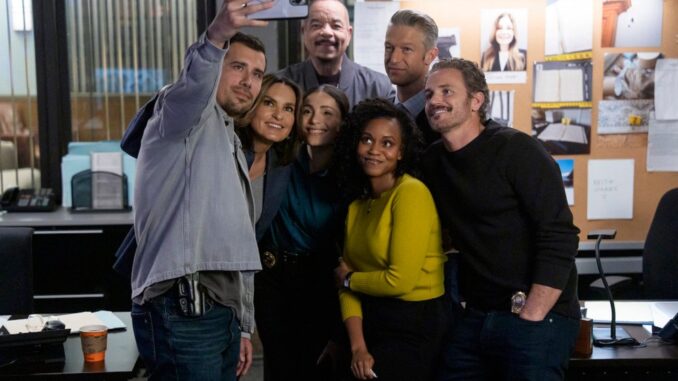
Different Cases, New Cameras: SVU Season 27 Promises to Rekindle Its Golden Moment
“Law & Order: Special Victims Unit” has been a television institution for over two decades, a testament to its captivating blend of procedural crime drama and empathetic exploration of sensitive social issues. However, like any long-running series, SVU has experienced peaks and valleys. Season 27, fueled by the promise of “Different Cases, New Cameras,” aims to revitalize the show, rekindling the golden era of its early years while navigating the complexities of the modern landscape. This essay will explore how these two seemingly simple phrases encapsulate SVU’s ambition to reconnect with its core values, adapt to evolving storytelling techniques, and ultimately, reclaim its position as a cultural touchstone.
The phrase “Different Cases” suggests a deliberate shift away from the overly sensationalized and sometimes predictable storylines that have plagued the show in recent seasons. While SVU has always tackled difficult and controversial topics, there’s a need to return to the nuanced and character-driven narratives that initially resonated with audiences. This doesn’t necessarily mean avoiding headline-grabbing crimes altogether. Instead, it implies a deeper investigation into the “why” behind the crime, exploring the socio-economic factors, psychological complexities, and systemic failures that contribute to such devastating acts. Imagine a case that delves into the exploitation of vulnerable migrant workers, or one that examines the impact of social media on the rise of online grooming. These “Different Cases” could allow the writers to explore the gray areas of morality, presenting perpetrators as products of broken systems as well as individuals responsible for their actions. Furthermore, focusing on cases with lasting emotional consequences for the SVU team themselves can elevate the stakes and provide richer character development.
The “New Cameras” aspect, on the other hand, signifies a modernization of the show’s visual and narrative style. This likely encompasses more than just upgraded equipment. It could involve incorporating new filmmaking techniques like handheld camera work to heighten the sense of immediacy and realism during intense scenes. Perhaps the writers will experiment with different perspectives, offering glimpses into the lives of victims and perpetrators alike. The use of flashbacks, carefully curated montages, and even social media integrations could add layers of complexity and depth to the storytelling. Consider the potential impact of incorporating citizen journalism footage or online video evidence into the investigation. These “New Cameras” aren’t just about aesthetics; they represent a commitment to keeping the show visually engaging and relevant to contemporary audiences accustomed to fast-paced, visually-driven narratives.
However, the promise of “Different Cases, New Cameras” goes beyond superficial changes. It speaks to a deeper desire to recapture the essence of what made SVU so compelling in its early years. This era was characterized by a delicate balance between gripping crime drama and profound humanism. Detectives like Olivia Benson and Elliot Stabler were not just law enforcement officers; they were flawed, compassionate individuals deeply invested in the well-being of the victims they served. They navigated a complex legal system with empathy and moral ambiguity, forging strong bonds with each other and the survivors they helped. To rekindle this golden moment, Season 27 must prioritize character development and relationship dynamics, allowing the audience to connect with the SVU team on a personal level. This means delving into their individual struggles, exploring their vulnerabilities, and showcasing the toll that investigating these crimes takes on their mental and emotional health.
The challenge lies in navigating the evolving social landscape while staying true to the show’s core values. Issues like consent, gender identity, and racial justice have become increasingly nuanced and complex. SVU must approach these topics with sensitivity and authenticity, avoiding generalizations and stereotypes. This requires engaging with experts, consulting with advocacy groups, and prioritizing the voices of marginalized communities. Furthermore, the show must address the growing distrust in law enforcement, acknowledging the systemic biases that can lead to injustice. By tackling these issues head-on, SVU can demonstrate its commitment to social responsibility and remain a relevant and impactful voice in the cultural conversation.
In conclusion, the promise of “Different Cases, New Cameras” for SVU Season 27 is more than just a marketing slogan; it’s a declaration of intent. It signifies a commitment to evolving the show’s narrative style, exploring complex social issues with sensitivity, and prioritizing character development to recapture the emotional depth that defined its golden era. By embracing these changes, SVU has the potential to not only revitalize its storytelling but also to reaffirm its position as a powerful platform for raising awareness, sparking dialogue, and ultimately, advocating for a more just and compassionate world. Whether or not Season 27 lives up to these ambitious goals remains to be seen, but the potential is undeniably there to rekindle the magic and solidify SVU’s legacy as one of television’s most important and enduring dramas.
